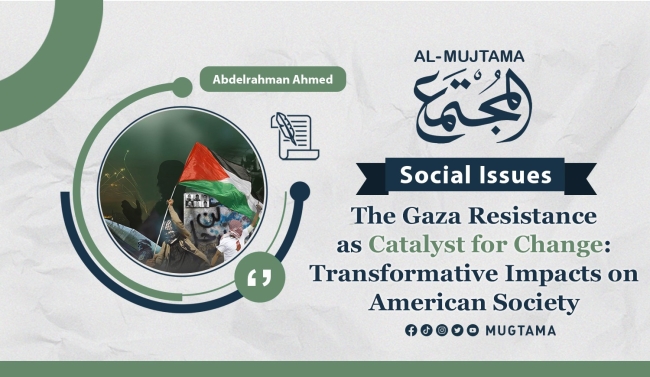The Gaza Resistance as Catalyst for Change: Transformative Impacts on American Society
The resilience of the Palestinian resistance in Gaza has reverberated globally, sparking transformative shifts in various facets of American society. From grassroots activism and academic discourse to public opinion and policy debates, the Gaza resistance has become a dynamic catalyst for change. This essay delves into the multifaceted impacts, exploring how the struggle in Gaza has prompted a reevaluation of historical alliances, fostered youth-led activism, ignited human rights advocacy, and influenced cultural expressions of solidarity.
Global Solidarity Movements:
The Palestinian resistance in Gaza has ignited global solidarity movements, with activists worldwide rallying in support of the cause. This solidarity extends to the United States, where individuals are critically examining their government's role in the conflict. The stark images and stories emerging from Gaza have compelled Americans to question the ethical implications of their nation's historical alliances, challenging the narrative of unwavering support for certain geopolitical interests.
Youth-Led Activism:
The youth-led nature of the resistance in Gaza resonates strongly with younger generations globally, including within the United States. Inspired by the courage and determination of their counterparts in Gaza, youth activists are leveraging social media platforms to raise awareness. This form of activism fosters a sense of connection and solidarity that transcends borders, creating a global network of individuals committed to advocating for justice in the Israeli-Palestinian conflict.
Human Rights Advocacy:
Documented human rights abuses in Gaza have given rise to a renewed focus on human rights advocacy. American activists, particularly those engaged in human rights causes, are compelled to reevaluate their government's foreign policy in light of the ethical implications of supporting regimes involved in actions deemed as violations of international law. The Gaza conflict serves as a stark reminder of the need for a principled approach to foreign policy that prioritizes human rights and adheres to international law.
Intersectionality in Activism:
The Gaza resistance has become a focal point for intersectional activism, connecting the struggles of the Palestinian people to broader issues of racial, social, and economic justice. Activists recognize the interconnectedness of various forms of oppression and are advocating for a comprehensive reexamination of U.S. policies that may contribute to systemic injustices both domestically and internationally. This intersectional approach encourages a nuanced understanding of the complexities inherent in the Israeli-Palestinian conflict.
Impact on Academic Discourse:
The ongoing impact of the Gaza conflict is felt in academic circles, where scholars and students engage in critical discussions about the historical context and geopolitical dynamics of the region. This academic scrutiny encourages a nuanced understanding of U.S. involvement, fostering an environment where historical narratives are questioned and reinterpreted. The Gaza resistance prompts a reevaluation of conventional wisdom, challenging entrenched perspectives and pushing for a more informed and nuanced analysis.
Diaspora Activism:
Activism within the Palestinian diaspora, including Palestinian-Americans, has gained momentum. Diaspora activists are actively challenging historical narratives that may not align with their lived experiences or perspectives. This activism prompts a reevaluation of the U.S. stance on the Israeli-Palestinian conflict, as individuals within the diaspora bring unique insights and personal narratives to the forefront of the conversation.
Public Opinion Shifts:
The vivid images and stories emerging from Gaza have led to significant shifts in public opinion within the United States. As more Americans become aware of the human suffering resulting from the conflict, there is a growing sentiment that demands a reassessment of the U.S. role in perpetuating such situations through its foreign policy decisions. The once unassailable support for certain geopolitical alliances is now subject to scrutiny, with a call for a more principled and ethical approach.
Impact on Policy Debates:
The Gaza resistance has injected new vigor into policy debates within the United States. Politicians and policymakers are facing increased scrutiny regarding their stances on the Israeli-Palestinian conflict. Activists are advocating for a more nuanced and ethical approach, calling for policies that prioritize human rights and adhere to international law. The traditional political discourse is being challenged, paving the way for a more informed and ethically grounded approach to foreign policy decisions.
Media Landscape Changes:
The coverage of the Gaza conflict and the Palestinian resistance has prompted changes in the media landscape. Activists are leveraging alternative media platforms to counter mainstream narratives, fostering a more diverse and inclusive discourse. This shift in media representation encourages critical thinking among the public, challenging preconceived notions and promoting a more nuanced understanding of the complex realities on the ground.
Cultural Expressions of Solidarity:
The cultural expressions of solidarity, including art, music, and literature, inspired by the Gaza resistance, have become powerful tools for activism. These expressions contribute to shaping public perceptions and fostering a cultural shift that encourages a more empathetic and critical view of historical events. Artistic mediums serve as a means of communication that transcends linguistic and cultural barriers, allowing individuals to connect with the human stories behind the geopolitical headlines.
Conclusion:
In summary, the Gaza resistance serves as a dynamic catalyst for change, influencing various facets of American society. From grassroots activism and academic discourse to public opinion and policy debates, the impact of this resistance extends beyond the geopolitical context. It shapes a broader narrative that encourages a reevaluation of historical events and a call for ethical and just foreign policy decisions. The transformative power of the Gaza resistance lies not only in its immediate effects on the Israeli Occupation but also in its ability to inspire a more informed, empathetic, and ethically grounded approach to global issues within American society.


